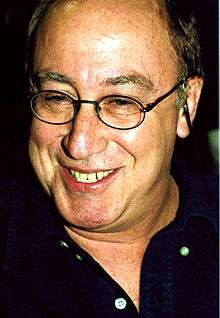Yisrael Poliakov
| Yisrael Poliakov | |
|---|---|
 | |
| Born |
July 7, 1941 Jerusalem, Israel |
| Died |
October 30, 2007 (aged 66) Petah Tikva, Israel |
| Years active | 1964–2007 |
| Spouse(s) | Shoshana |
Yisrael "Poli" Poliakov (Hebrew: ישראל פוליאקוב) (July 7, 1941 – October 30, 2007) was an Israeli comedian and actor. Poliakov was born in Jerusalem, and grew up in Tel Aviv. He became one of the three members of the Israeli comedy group, HaGashash HaHiver (The Pale Tracker).[1]
Career
Poliakov originally chose a career as a farmer and studied at the Kfar HaYarok agricultural high school. This changed when he was spotted at a school party by members of Nahal Brigade's entertainment troupe, and he was soon recruited by the group. In 1961, he joined the original singing band Hatarnegolim (The Roosters) that had been founded by Naomi Polani, the original cast of which broke up in 1964.[1][2][3][4]
Poliakov appeared in a number of famous Israeli films, often with members of HaGashash HaHiver. His film credits include Schlager (The Hit) in 1979; Krav al Hava'ad (The House Committee) in 1986; and Givat Halfon Eina Ona (Halfon Hill Doesn't Answer) in 1975. He appeared in a number of Israeli television roles, and produced and acted in his daughter's television show, It's All Honey.[1]
Poliakov began working on stage as a theater actor in 2000. His credits include The Israeli Family, The Rubber Merchants, God's Finger, Mother Courage and The Return of Moris Shpigelman.[1]
HaGashash HaHiver
Abraham "Pashanel" Deshe, a producer and agent who died of cancer in 2004 at age 78, started HaGashash HaHiver in late 1963. The group was composed of three members – Poliakov, Yeshayahu "Shaike" Levy and Gavriel "Gavri" Banai. They created a "unique Israeli comedy group," according to the Jerusalem Post. Their jokes, which included the best and worst of Israeli society, often achieved a cult status among fans.[1]
In 2000, the group and its three members were awarded the Israel Prize for lifetime achievement & special contribution to society for their work.[5] The judges wrote of their award decision:
The uniqueness of HaGashash HaHiver is in its two faces: On the one hand, it reflects the life and the culture that were created in Israel during its first 50 years and in the course of wars, immigration absorption and the struggle for its existence. On the other hand, it has taken an active role in shaping this culture, creating its language and sketching its identity.... Their language, Gashashit, and the images they created broke the walls of the inflexible Hebrew language and became standard idiomatic phrases, so much so that he who doesn't know them doesn't know a large part of the culture that has sprouted here. Phrases such as, 'Drive in peace, the keys are inside,' 'There was an engine?' [referring to a mechanic who cheats a client], 'Israbluff' and many others that became part of our everyday language.[1][6]
Death
Yisrael Poliakov died of cancer at the Rabin Medical Center-Beilinson Campus in Petah Tikva on October 30, 2007, at the age of 66, following a two-week hospitalization for heart problems. Poliakov's coffin was taken to Cameri Theater in Tel Aviv for a public memorial service, and was buried in a cemetery in Kibbutz Einat.[1]
Fellow HaGashash HaHiver member Yeshayahu Levy told Israel Army Radio: "...lost a brother. There is no other word. We've been together since 1958, and he was part of me. He was a great talent, an outstanding comic actor, and a wonderful friend... The pain is great."[1]
Actor Moshe Ivgi, who costarred with Poliakov in The Rubber Merchant, told the Jerusalem Post: "He was a great actor who was blessed with comic and dramatic qualities, and it was a pleasure to work with him. Poli was a modest and ego-free man, full of love, and I am sure he would have done so much more."[1]
President Shimon Peres stated "Generations upon generations watched him and fell captive to his charm".[7]
See also
References
- 1 2 3 4 5 6 7 8 9 Paz, Shelly (October 31, 2007). "Comic icon Yisrael 'Poli' Poliakov dies at 66". (Note: free summary links to full, fee-based article) Jerusalem Post. Retrieved December 3, 2007.
- ↑ Don Rubin (1999). The World Encyclopedia of Contemporary Theatre: Europe. Retrieved July 31, 2011.
- ↑ Motti Regev, Edwin Seroussi (2004). Popular music and national culture in Israel. Retrieved July 31, 2011.
- ↑ Ury Eppstein, Michael Ajzenstadt (June 13, 1999). "These chicks have got to grow". The Jerusalem Post. Retrieved July 31, 2011.
- ↑ "Israel Prize Official Site (in Hebrew) – Recipients’ C.V.".
- ↑ "Israel Prize Official Site (in Hebrew) – Judges' Rationale for Grant to Recipients".
- ↑ "Israeli comic 'Poli' dies". Jewish Ledger. November 13, 2007. Retrieved December 3, 2007.
External links
|